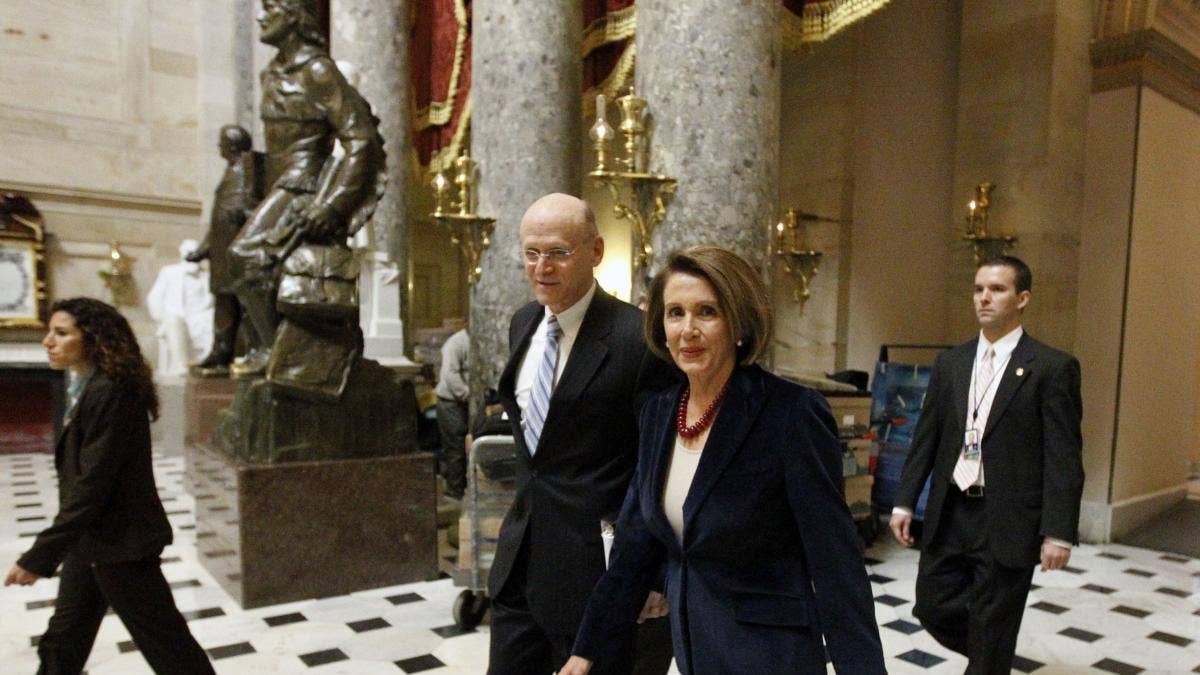
Speaker Nancy Pelosi, D-Calif., right, walks with her chief of staff John Lawrence, through Statuary Hall on Capitol Hill in Washington Tuesday, Dec. 21, 2010.(AP Photo/Alex Brandon)
Nancy Pelosi flew home to California for Christmas on a private military jet. She will return to Washington in two weeks as just another seat number on a commercial flight.
As she sits cheek by jowl with her fellow eastbound travelers, the former speaker will have a chance to ponder the reason for her reduced status. It is imperative to the future of her party that she comes up with the right answer.
Democrats have been able to put off this hard question for two months as they busied themselves with a gargantuan lame-duck legislative agenda. Rather than going back to their home districts to consider the meaning of the worst midterm defeat for Democrats since 1938, the party's leaders reconvened in Washington.
As members finally left town for the holidays, they were still marveling at the accomplishments of the past two years, particularly passage of President Obama's national health-care law.
Democrats controlled the House for just four years, the shortest span for either party since the Republicans' two-year reign from 1952 to 1954. But in that time, Democrats pushed through an extraordinary amount of legislation.
Beyond Obama's health-care law, there was a giant set of regulations for the financial sector, the confirmation of two Supreme Court justices, ratification of a nuclear treaty with Russia and allowing gay service members to express their sexualities.
Democrats changed the size, shape and role of government in a remarkably brief period of time.
A post-lame-duck video montage put out by the Obama campaign organization had the feel of something that college seniors might make about their whirlwind undergraduate years: Can you believe we did all that? The only thing missing was Green Day in the background singing "Time of Your Life."
But not even the biggest lame duck in history could keep the reality of the Democratic disaster of 2010 from creeping in and that terrible question: Why?
The spin even before the midterms was that the election was a referendum not on Democratic leadership, but on the economy. The argument from the Obama White House and Democratic leaders on Capitol Hill was that Republicans wrecked the economy but that voters would still blame the party in power.
You know the story about the car and the ditch and the keys and the Slurpee.
While Obama did take responsibility for not being a more effective salesman of his party's efforts to revive America's economy, the suggestion remained that Democrats were being unfairly punished by an electorate that just didn't understand.
Senate Majority Leader Harry Reid explained it to the New York Times thusly: "The economy has been awful all over the country. The economy is the reason you had the uproar from the Tea Party. That's all it was."
Democrats will be in a bad way for many years if they write of the political cataclysm of 2010 as an unavoidable result of an unavoidably bad economy.
Not only would that invite Democrats to draw unflattering conclusions about voters by suggesting that they were not intellectually able to grasp the situation, but it lets members avoid asking hard questions about the present and future of their party.
It was not the economy in abstract, but how Democrats handled it that determined the political arc of the last year. And the general consensus was that Democrats gave the economy short shrift in favor of pursuing their own causes.
Americans decidedly did not like the Democrats' central agenda item of health care, and that, perhaps more than anything, did in the party's majority.
Many moderate voters who might have been persuaded that Washington needed to play a larger role on health care did not believe that a period of recession and stratospheric federal debt was the right moment for the task.
Others sympathetic to the idea of health reform in general were put off by the means by which the Obama plan was produced - too much secrecy, too many pages and lots of procedural end arounds. It took more than a year to complete, and wasn't built in a way that would inspire confidence in the final product.
In the end, the Obama Democrats reinforced the worst political stereotypes that surround their party with a hyper-ambitious, expensive legislative agenda at a time when voters were looking for simplicity and modesty from Washington.
While Democrats marvel at the enormity of their accomplishments in the 111th Congress, they should also realize that legislative success helped produce electoral failure.
The former speaker has brought Steven Spielberg on board to help with a Democratic rebranding and retained her position at the top of her party in the House with a promise of no retreat and a speedy return to majority.
If she is to succeed, she must first understand the fundamentals of how they lost it in the first place. Perhaps some time on the tarmac with her fellow commercial flyers will help her work that out.




